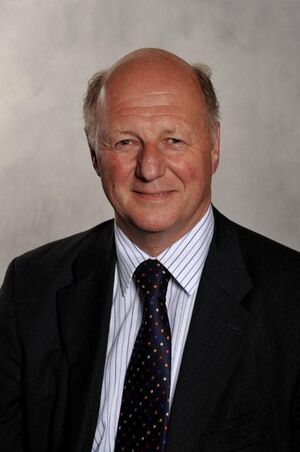James Paice
 | |||||||||||||||||||||
| Born | 24 April 194 Felixstowe, England | ||||||||||||||||||||
| Alma mater | Framlingham College, Writtle Agricultural College, University of Essex | ||||||||||||||||||||
| Spouse | Ava Patterson | ||||||||||||||||||||
| Party | Conservative | ||||||||||||||||||||
UK Minister of State at the Department for Environment, Food and Rural Affairs from 2010–2012
| |||||||||||||||||||||
Sir James Edward Thornton Paice is a Conservative Party politician in the United Kingdom. He was the Member of Parliament (MP) for South East Cambridgeshire between 1987 and 2015, when he stood down from parliament. He was the Minister of State at the Department for Environment, Food and Rural Affairs from 2010–2012 until being removed in the 2012 government reshuffle.
Early and personal life
Born in Felixstowe, Suffolk, Paice went to the independent Framlingham College. At the Writtle Agricultural College, he received a National Diploma in Agriculture in 1970.[1] He was a farm manager from 1970 to 1973. From 1973 to 1979, he was a farmer and contractor. From 1979 to 1987, he was Training Manager at Framlingham Management and Training Services. At United Framlingham Farmers Ltd, he was non-executive Director from 1987 to 1989, then Director from 1989 to 1994. From 1976 until 1987, he was on Suffolk Coastal District Council, becoming the youngest ever chairman in 1983.
Paice married Ava Patterson in 1973. They have two sons.
Parliamentary career
Paice contested the Caernarfon seat for the Conservatives in the 1979 general election but lost to incumbent Dafydd Wigley of Plaid Cymru. At the 1987 general election he was chosen by the Conservatives to replace their incumbent member of parliament for South East Cambridgeshire, former Foreign Secretary Francis Pym, who was stepping down. Paice won the seat with a majority of 17,502.
At Westminster Paice first served as Secretary of the Backbench Employment Committee from 1988 to 1989 and of the Backbench Horticulture and Markets Sub-Committee (1988–1989). He was also a member of the Employment Select Committee from 1987 until 1989.
Paice was made a minor member of the government in December 1989 as the Parliamentary Private Secretary to the Minister of State at the Ministry of Agriculture, Fisheries and Food, Baroness Trumpington. A year later he became the PPS for John Gummer, who was then the Minister of Agriculture, Fisheries and Food (1990–1993) and later Secretary of State for the Environment (1993–1994). In July 1994 he was promoted to Parliamentary Under Secretary of State at the Department of Employment and served until the Conservative defeat in the 1997 general election.
In opposition, Paice became a spokesman for Agriculture, Fisheries and Food (1997–2001) and later on Home Affairs (2001–2003). Under the leadership of Michael Howard, he was appointed Shadow Minister for Home, Constitutional and Legal Affairs. From September 2004 until his return to government, he served as Shadow Minister for Agriculture, a post he later took up in government.
After the 2010 general election, Paice was appointed Minister of State for Agriculture and Food at the Department for Environment, Food and Rural Affairs in the Conservative-Liberal Democrat coalition government. He served until 4 September 2012 when he was removed as part of a cabinet reshuffle.
On 10 July 2012, during an interview with BBC Radio 4's Farming Today, Paice he admitted that he did not know how much a pint of milk cost.[2] Nevertheless, in October 2013 he was appointed chairman of the Glasgow-based First Milk farmers’ cooperative on an annual salary of £125,000, for which it was proposed that he work one day a week.[3] Under Paice's chairmanship, the co-operative announced in January 2015 that payments to dairy farmers would be deferred by two weeks and that 1.5 pence per litre would be deducted from the payments to pay for “capital investment”.[4][5] It also announced that from February 2015, it would pay its members an average 21.4 pence per litre – 10p per litre less than some major supermarkets criticised for the low levels of their payments to dairy farmers for milk.[6][3]
References
- ↑ https://web.archive.org/web/20101228073548/http://writtle.ac.uk/Level-3-Extended-Diploma-in-Agriculture
- ↑ https://www.bbc.co.uk/news/uk-18792132
- ↑ a b Bio-Waste Spreader’ (23 January 2015). "The Agri Brigade". Private Eye. London. p. 15
- ↑ https://web.archive.org/web/20150123021046/http://www.farmersguardian.com/home/business/first-milk-will-not-pay-jan-12-milk-cheque-amid-cashflow-issues/69784.article
- ↑ https://www.independent.co.uk/news/uk/home-news/how-did-milk-become-cheaper-than-water-9990760.html
- ↑ https://www.bbc.co.uk/news/uk-politics-30882208